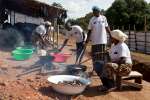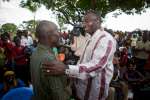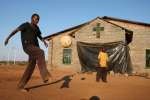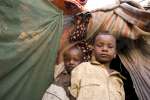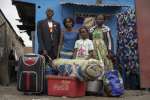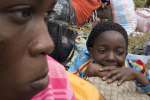- Text size
 |
|  |
|  |
| 
- Français
Angolan builds small business empire in Zambian refugee settlement he calls home
Making a Difference, 21 January 2010
MAYUKWAYUKWA, Zambia, January 21 (UNHCR) – Fortune did not seem to be shining on Robby Chiyengo Bihinda when he was born 40 years ago in this remote settlement for Angolan refugees in Zambia's Western Province.
His parents had fled to Zambia from Angola in 1968 during the independence struggle and Bihinda was born two years later. Angola gained independence from Portugal in 1975 but was almost immediately plunged into civil war, scotching the hopes of people like Bihinda's mother and father to return home.
The future looked bleak, but at least the refugees in the sparsely populated Mayukwayukwa region were allowed to work plots of land as subsistence farmers. Opportunities to do better were scarce in a country where 60 per cent of the population live on US$1 a day, but a determined Bihinda took them.
His business acumen, determination and resolve, together with key educational support from UNHCR, have helped him become self-sufficient and propelled him to a position of relative wealth within the refugee community in Mayukwayukwa.
Bihinda established a good foundation for his future by completing his secondary education at Kaoma High School. UNHCR, which places great importance on education for young refugees, funded his studies. He also took part in UNHCR-run courses on entrepreneurship which have helped him a lot.
When Bihinda had completed his academic studies, UNHCR's implementing partner, The Lutheran World Federation, sponsored his training as a mechanic with the Nippon Motors outlet in the Zambian capital, Lusaka.
The ambitious young man, who was then in his early twenties, worked as a mechanic to save up some capital and then opened a small business buying farm products from fellow refugees and selling them in Lusaka and other cities. He bought and restored a battered old Land Rover to transport the produce.
Today, he runs a small business empire in Mayukwayukwa, including a fleet of three trucks and two Land Rovers for his thriving transportation business, a flour mill, a general store with restaurant, and a metal workshop. He also owns livestock and property and is currently building a hotel. His local clients include refugees, Zambians and aid workers.
"I started off in 1996 with a second-hand Land Rover, which I used to transport people from Mayukwayukwa to Kaoma and [the Western Province capital] Mongu," Bihinda said, adding: "Now I take people all the way to Lusaka."
His wife handles the business in Mayukwayukwa, while Bihinda concentrates on his transportation and construction interests. He has been able to spread some of his good fortune by employing refugees and some Zambians in his ventures.
"From almost nothing, I have accumulated these assets through hard work, sacrifice and resilience over the years," Bihinda said, adding that although his parents came from Angola he felt that Zambia was his home. "Starting a new life outside Zambia might not work for me. So, I want to play a part in Zambia's development in my own small way."
Zambia currently hosts slightly less than 57,000 refugees, mainly Angolans (25,300) and Congolese (21,900), but also including Burundians, Rwandans, Somalians and Ugandans.
By Kelvin Shimo in Mayukwayukwa, Zambia


